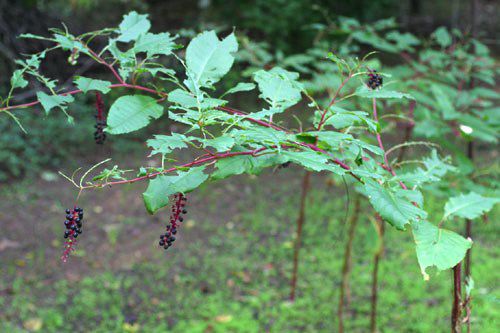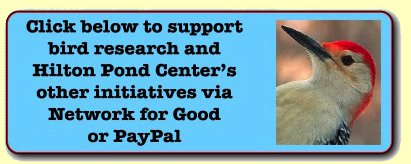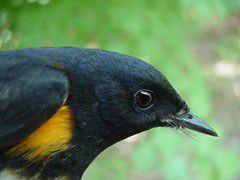|
|
|||
|
POKE SALLET? For the past few weeks, the bird banding venue at Hilton Pond Center has been decorated with all colors of the spectrum. To name a few, we've captured a trio of yellow- breasted Magnolia Warblers, a Summer Tanager with crimson plumage, and an adult male American Redstart with sharply contrasting black and orange feathers. Indeed, many of the larger birds we've captured--and especially a slew of Swainson's Thrushes--have anointed our digits with royal color as they shared their favorite food with us. Seems that lots of migrant birds are attracted to the succulent black berries of the local Pokeweed crop, and the purple pigment passes right through our avian friends to stain our skin and garments. Pokeweed, Phytolacca americana, is a rambunctious native plant with a reputation for loosening up the gastrointestinal tracts of organisms other than birds--including pigs, pets, and people. In spring, fresh and tender Pokeweed leaves can be picked and prepared as "poke sallet," the latter word being an Old English term for "cooked greens"--as opposed to a "salad" that is uncooked. Woe be the person, however, who mixes toxic Pokeweed root fibers with the green leaves or fails to boil the shoots long enough to drive out all the acids and alkaloids. Individual Pokeweed flowers are small and dainty, growing in plume-like "racemes." The quarter-inch blossom is unusual in that it lacks petals but has four or five white or greenish sepals--the structures that cover a flower bud before it opens. Soon after pollination--which apparently can be facilitated by ants (below right)--the shiny, green, and globular Pokeweed ovary begins to ripen into the more familiar purplish-black berry.
If you've got Pokeweed growing in your neighborhood, you've probably noticed that your sidewalk, swimming pool, or car roof frequently becomes the target of aerial Pokeweed assault. From August through mid-October, the back deck on the old farmhouse at Hilton Pond Center acquires a purple polka-dotted appearance, thanks to the bombardier birds with a full payload of Pokeweed berries. It's times like this that we're reminded of the old line, "Birdie, birdie, in the sky, gee I'm glad that cows don't fly."
All text & photos © Hilton Pond Center
Checks can be sent to Hilton Pond Center at: All contributions are tax-deductible on your If you enjoy "This Week at Hilton Pond," please help Support Hilton Pond Center for Piedmont Natural History. It's painless, and YOU can make a difference! You may wish to consult our Index of all nature topics covered since February 2000. |

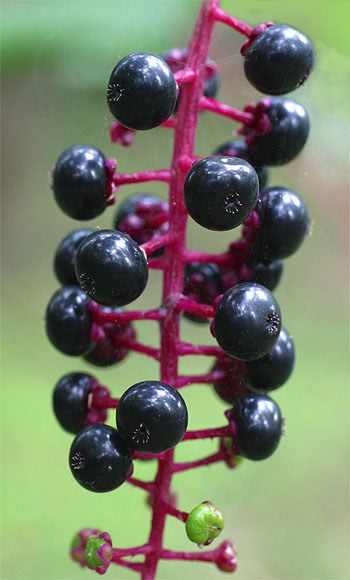 But another color--purple--has brightened our days, to say nothing of our hands and our shirt and our banding notebook as well.
But another color--purple--has brightened our days, to say nothing of our hands and our shirt and our banding notebook as well.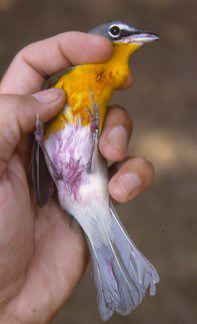 These compounds are slow-acting but violent in their effects, which can vary among vomiting, abdominal spasms, diarrhea, convulsions, and even death by respiratory paralysis--none of which seem the slightest bit pleasant to us. Although children sometimes eat a Pokeweed berry or two, they seldom suffer the most severe reactions, possibly because the pulp contains lesser quantities of poison and the kids don't chew up the toxin-laden seeds. Curiously, birds such as Yellow-breasted Chats (left) consume prodigious portions of Pokeweed seeds with impunity, although they may end up painting their plumage with purple Pokeweed pigment.
These compounds are slow-acting but violent in their effects, which can vary among vomiting, abdominal spasms, diarrhea, convulsions, and even death by respiratory paralysis--none of which seem the slightest bit pleasant to us. Although children sometimes eat a Pokeweed berry or two, they seldom suffer the most severe reactions, possibly because the pulp contains lesser quantities of poison and the kids don't chew up the toxin-laden seeds. Curiously, birds such as Yellow-breasted Chats (left) consume prodigious portions of Pokeweed seeds with impunity, although they may end up painting their plumage with purple Pokeweed pigment.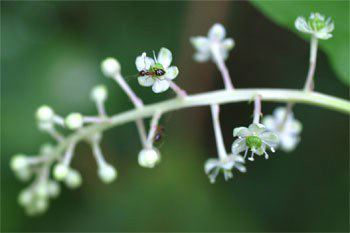 When a bird or small mammal "deposits" a partially digested Pokeweed fruit in a tiny mound of guano, the seed sprouts and eventually produces a thick, fleshy root. In turn, the root gives rise to a distinctive magenta stem (below left) that is smooth, hollow, and fibrous and may grow nearly ten feet tall. Plants this large assume an umbrella-like shape and produce hundreds of racemes and thousands of berries--all the better to fill the crops of hungry chats and thrushes.
When a bird or small mammal "deposits" a partially digested Pokeweed fruit in a tiny mound of guano, the seed sprouts and eventually produces a thick, fleshy root. In turn, the root gives rise to a distinctive magenta stem (below left) that is smooth, hollow, and fibrous and may grow nearly ten feet tall. Plants this large assume an umbrella-like shape and produce hundreds of racemes and thousands of berries--all the better to fill the crops of hungry chats and thrushes. 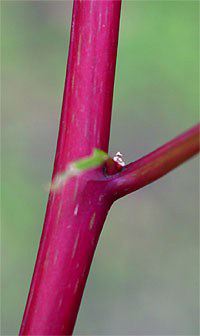 Mature Pokeweed leaves are up to a foot long and a third as wide, and appear to be favorite forage for several caterpillar species (bottom photo), including larvae of the Southern Army Moth. By early autumn, any Pokeweed foliage that survived the caterpillar onslaught begins to wither, the red stems turn brown, and the Pokeweed plant dies back to the ground. The Pokeweed's perennial root survives, however, and is likely to send up an even bigger and more vigorous plant the following spring.
Mature Pokeweed leaves are up to a foot long and a third as wide, and appear to be favorite forage for several caterpillar species (bottom photo), including larvae of the Southern Army Moth. By early autumn, any Pokeweed foliage that survived the caterpillar onslaught begins to wither, the red stems turn brown, and the Pokeweed plant dies back to the ground. The Pokeweed's perennial root survives, however, and is likely to send up an even bigger and more vigorous plant the following spring.